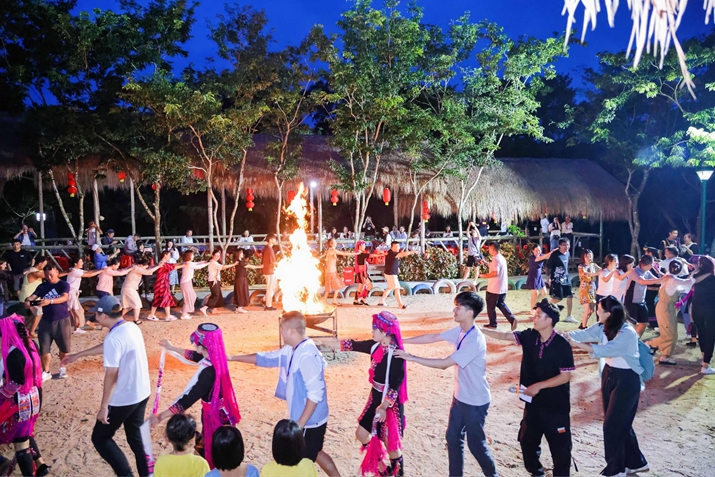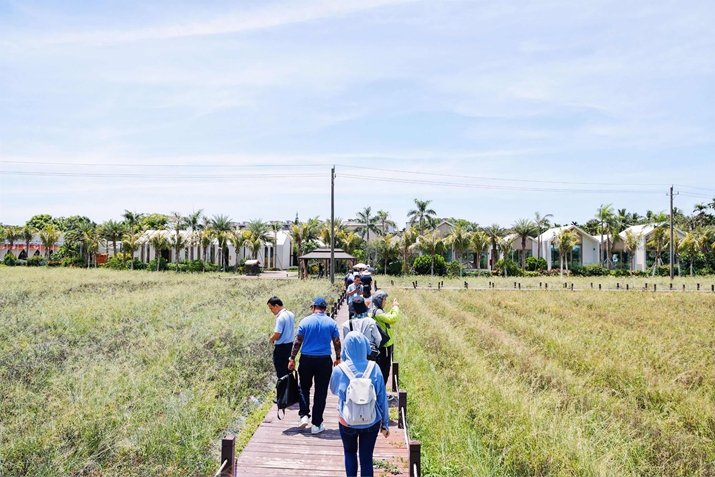| Business |
| Rural areas in Hainan prosper through tourism and service industries | |
|
|
 Hosts from China's Li and Miao ethnic groups welcome visitors with a bonfire party at Zahan Village in Qiongzhong Li and Miao Autonomous County, Hainan Province, on July 18 (COURTESY PHOTO)
"Ben Ge Nei" in the language of the Li ethnic group means "Come here." It has become the welcoming slogan for tourists stepping into Qiongzhong Li and Miao Autonomous County, Hainan Province. Zahan, nestled in between two mountains and one of the highest villages in all of Hainan, is one place in the county you won't regret visiting. It is rare to see Li and Miao people living together in one village, and subsequently tourists can get the best of both different cultures at the same time. In addition, with its dense forests interrupted by zigzagging streams, and blue skies with cottony clouds floating by, Zahan features some absolutely fantastic natural scenery. However, in contrast to this wealth of natural tourism resources, the villagers' annual per-capita income reached a mere 946 yuan ($138) in 2009, well below the national poverty line of 1,196 yuan ($175) at that time, according to Lin Gang, a village official. Benefiting from a localized, targeted development pattern, "tourism-led initiatives have seen villagers' annual per-capita income rise to 18,000 yuan ($2,784) in 2020," Lin added. The Zahan pattern Many regions of China, including Hainan, have launched programs encouraging enterprises to invest in the poorer rural areas to improve the quality of life. Zahan, too, has carved out a path leading to poverty alleviation and vitalization befitting its own conditions. Government, enterprises, rural cooperatives and villagers jointly shoulder the responsibilities at hand. For example, state-owned Qiongzhong Hotel provides management experience and investment to Zahan to set up bed and breakfast or homestay and agritainment ventures, as well as helps operate these facilities. The introduction of external investment has also boosted the villagers' entrepreneurial spirit. Currently, Zahan has developed 18 agritainments—from an initial two—through the renovation of old village houses. Generally, 60 percent of their profits go to the homeowners, 35 percent to the investors and operators, and the remainder to the village cooperative. Unsurprisingly, the arrangement has managed to stir up enthusiasm all-round. Such agritainment venues often hold bonfire parties with traditional food, music and dance. "The business is managed by several young couples in the village," Xu Qian, an enterprise representative in the village, told Beijing Review. Local specialties such as black pork, native chicken and wild vegetables prove very popular menu items during such parties. Furthermore, the local government has promoted an environment-priority development pattern to guarantee the sustainability of tourism resources. Zahan has transformed itself from an impoverished village into a famous tourist destination, as well as a model of poverty alleviation, according to Lin. Booking a room at any of Zahan or other villages' agritainment venues is becoming more and more difficult in the high season. And the sizzling market has also improved local residents' lives. The Zahan pattern suits local conditions, Xu said, adding that it has contributed a lot to the cause of poverty alleviation. By now, China has eradicated absolute poverty and the country is shifting its national strategy from poverty alleviation to rural vitalization. Those villages and enterprises involved can continue their journey and usher in a new chapter of growth. "As Zahan has been lifted from absolute poverty, we will continue our mission here in the next five years to prevent a return to poverty and also to find more effective measures to realize its vitalization," Xu added.  Visitors stroll around Dalupo Village in Qionghai, Hainan Province, on July 17 (COURTESY PHOTO)
Following the path Not only Zahan, but many other villages in Hainan also opt to travel down a similar path of cooperating with state-owned or private enterprises in developing tourism, all according to their own circumstances and with their own advantages. Nanqiang and Dalupo villages in the town of Boao, Qionghai, nowadays reap the benefits of the branding effect generated by the Boao Forum for Asia (BFA), a non-profit organization that hosts high-level forums for leaders from Asian governments, businesses and academia in the seaside resort. The BFA Annual Conference 2021, which ran from April 18 to 21, attracted more than 2,600 representatives and 1,200 journalists from over 60 countries and regions. Country Garden, a property development company based in Guangdong Province, has stretched out both its arms and legs across the two villages. In addition to transforming traditional architectures into superior homestays, the company has also constructed modern conference halls in the area. "During the BFA Annual Conference 2021, Nanqiang and Dalupo shared a total of 41 Boao-related activities," Liu Ya, a project manager with Country Garden, told Beijing Review. A series of service facilities, such as restaurants and bookstores, have been or will be launched in Nanqiang and Dalupo, Liu continued. "We are creating a project entitled Nanqiang-Dalupo Beautiful Countryside right here," he added. Those newly built modern architectures not only provide visitors with an exceptional experience, but also improve the villages' service capacities. Zhonghua, a member of the local village committee in Boao, said high-quality service is essential for the development of the tourism industry. And of course, in the meantime, the arrival of such industries has provided villagers with more job opportunities, Liu said. (Print Edition Title: Vivas Las Villages) Copyedited by Elsbeth van Paridon Comments to taoxing@bjreview.com |
|
||||||||||||||||||||||||||||||
|
